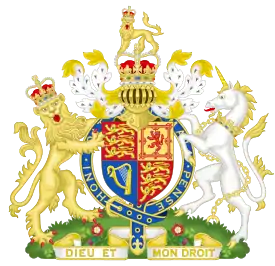Twinings
Twinings (/ˈtwaɪnɪŋz/) is an English marketer of tea and other beverages, including coffee, hot chocolate and malt drinks, based in Andover, Hampshire.[2] The brand is owned by Associated British Foods. It holds the world's oldest continually-used company logo, and is London's longest-standing ratepayer, having occupied the same premises on the Strand since 1706.[3] Twining tea varieties include black, green and herbal teas, along with fruit-based cold infusions.[4]
 | |
 Twinings' shop on the Strand in central London was established as a tea room in 1706 | |
| Owner | Associated British Foods |
|---|---|
| Country | United Kingdom |
| Introduced | 1706 |
| Markets | Beverages[1] |
| Website | www |
History
Twinings was founded by Thomas Twining, of Painswick, Gloucestershire, England, who opened Britain's first known tea room, at No. 216 Strand, London, in 1706; it still operates today.[5][6] The firm's logo, created in 1787, is the world's oldest in continuous use.[7][8]
Holder of a royal warrant,[9] Twinings was acquired by Associated British Foods in 1964.[10] The company is associated with Earl Grey tea, a tea infused with bergamot, though it is unclear when this association began, and how important the company's involvement with the tea has been. Competitor Jacksons of Piccadilly– acquired by Twinings during the 1990s –also had associations with the bergamot blend.[11]
In April 2008, Twinings announced their decision to close its Belfast Nambarrie plant, a tea company in trade for over 140 years.[12] Citing an "efficiency drive"; Twinings moved most of its production to China and Poland, in late 2011, while retaining its Andover, Hampshire factory with a reduced workforce.[9]
Ethics
Twinings' ethical tea programme, Sourced with Care, aims to improve the quality of life in the communities from which it buys tea.[13] The company is a founding member of the Ethical Tea Partnership,[14] a not-for-profit membership organisation of tea-packing companies which undertake monitoring and improving conditions on tea estates in all major tea-growing regions.[15] Twinings has an Ethical Code of Conduct[16] and works with all its packaging and raw material suppliers to ensure decent working conditions in the supply chain.[17]
In August 2018, Twinings published a list of all its tea suppliers in India on its Sourced with Care website. This came after Traidcraft Exchange called on all the major UK tea brands to show the public which tea plantations they buy from and crack down on modern slavery in the supply chain. Traidcraft Exchange welcomed the move, their policy adviser, Fiona Gooch, saying that it would put "pressure on the other big tea brands ... to follow suit".[18]
The Ethical Consumer Group,[19] who publishes appraisals of the ethical practices of major companies, have assigned Twinings an 'F' Rating. Whilst Twinings were rated 'green' in Greenpeace's 2011 Truefood Guide, signifying a clear policy on excluding GM-derived ingredients, and some of Twinings Asha range of teas are certified Fairtrade, Twinings parent company, Associated British Foods, who 100% own Twinings, are responsible for an extensive list of unethical practices. Reports collated by Ethical Consumer Group to determine this ranking include:
- A 2015 BBC investigation which discovered the company paying workers in India less than £2 a day with disregard for their health, using unprotected chemical sprays, and use of child labour. [19]
- A 34.2% score in Newsweek Green Rankings, which ranks the world's largest publicly traded companies on eight indicators covering energy, greenhouse gases, water, waste, fines and penalties, linking executive pay to sustainability targets, board-level committee oversight of environmental issues and third-party audits. [19]
- A Forest 500 score of 2/5 in its commitment to zero deforestation.[19]
- A Carbon Disclosure Project score of D with regards to company efforts and practice towards removing commodity-driven deforestation and forest degradation from its direct operations and supply chains [19]
- A worst rating by Ethical Consumer for their use of Palm Oil [19]
- A 2/19.5 score in Rank a Brand's assessment of sustainable cotton use, making it one of the weaker performing companies [19]
- A score in the 20-30 band range of the 2019 Corporate Human Rights Benchmark. It assessed 200 of the largest publicly traded companies in the world from the Agricultural Products, Apparel, Extractives and ICT Manufacturing sectors on 100 human rights indicators. [19]
- In 2018, KnowTheChain benchmarked 120 large global companies in the ICT, Food & Beverage, and Apparel & Footwear sectors on their efforts to address forced labour and human trafficking in their supply chains. This company received a score of 30/100. [19]
- In February 2013, ActionAid (UK) released a report revealing that this company is dodging its tax bill in Zambia, one of the world's poorest countries. ActionAid claims ABF has avoided an estimated US$27 million in taxes in Zambia since 2007, where the company operates a sugar company. ABF denies the allegations [19]
- Oxfam's 2016 Behind the Brands Scorecard assesses the agricultural sourcing policies of the world's 10 largest food and beverage companies. It exclusively focuses on publicly available information that relates to the policies of these companies on their sourcing of agricultural commodities from developing countries. This company ranked equal last with a score of 36%. [19]
- This company scores Ethical Consumer's worst rating for the likely use of tax avoidance strategies, and has at least two high risk subsidiaries in tax havens.[19]
Notable members of the Twining family
- Thomas Twining (1675–1741), tea merchant, Twinings founder
- Mary Twining (1726-1804), tea merchant, mother of Richard Twining
- Thomas Twining (1735–1804), classical scholar
- Richard Twining (1749–1824), tea merchant
- William Twining (1790-1835), military physician
- Elizabeth Twining (1805–1889), botanical illustrator
- Louisa Twining (1820–1912), social reformer
- Edward Twining (1899-1967), diplomat
References
- "Twinings Teas". Twinings. Retrieved 17 November 2018.
- "Other Drinks". Twinings. Retrieved 17 November 2018.
- Winn, Christopher (2007). I Never Knew That About London. Ebury Press. ISBN 978-0-09-191857-6.
- "Twinings Tea Blends and Infusions". Twinings.co.uk. Retrieved 15 February 2020.
- Phillips-Evans, James (2012) The Longcrofts: 500 Years of a British Family, Amazon, pp. 244–245
- "Twining & Co". Lloyds Banking Group. Retrieved 3 June 2019.
- "History of the Twinings Tea Company". Twinings. Retrieved 13 February 2018.
- Standage, Tom (2005). A history of the world in six glasses. New York: Walker. p. 202.
- "Twinings to leave Britain for Poland". The Telegraph. 6 September 2010. Retrieved 10 October 2019.
- Hall, Nick (2 June 2000). The Tea Industry. Woodhead Publishing Ltd. p. 58. Retrieved 10 October 2019.
- Glyn Hughes. "The Foods of England – Earl Grey Tea". foodsofengland.co.uk. Retrieved 20 September 2013.
- "Tea Time Over For Nambarrie". Northern Ireland, United Kingdom: 4NI.co.uk Northern Ireland News. 11 April 2008. Retrieved 17 January 2009.
One of Northern Ireland's top teas – and a favourite in Scotland too – is no longer to be packed in central Belfast.
- "Home | Twinings Sourced With Care". www.sourcedwithcare.com. Retrieved 12 February 2018.
- "Ethical Tea Partnership – Working for a Responsible Tea Industry". United Kingdom. Archived from the original on 5 September 2008. Retrieved 17 January 2009.
- "Ethical shopping guide to Tea". Ethical Consumer. December 2013. Retrieved 20 July 2017.
- "Twinings Ovaltine Code of Conduct" (PDF). Twinings.co.uk. 27 March 2012. Archived from the original (PDF) on 25 April 2014. Retrieved 2 January 2013.
- "Associated British Foods: Corporate responsibility".
- Selwood, Daniel. "Twinings publishes full list of its tea suppliers in India". The Grocer. Retrieved 17 November 2018.
- "Shop Ethical! | Your ethical consumer guide". www.ethical.org.au. Retrieved 3 March 2020.
External links
| Wikimedia Commons has media related to Twinings. |

.svg.png.webp)


